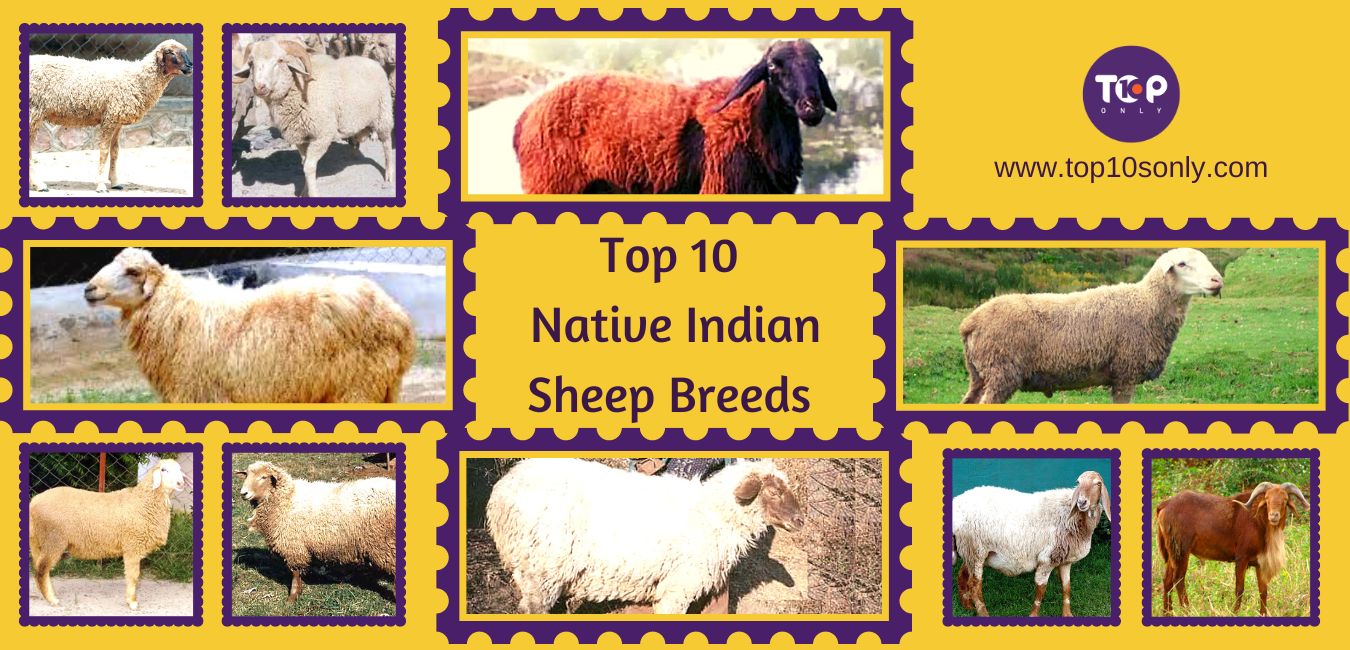India’s abundant ovine and bovine population offers a rich genetic diversity that few countries can match. Among them, sheep play a vital role in the livelihoods of society, from economically disadvantaged groups to entrepreneurs. They provide both meat and other valuable resources such as manure and skin, making them an essential source of income for breeders. Additionally, sheep milk is of great importance in some regions of Gujarat, Rajasthan, and Jammu and Kashmir. In India, there are 42 registered sheep breeds, with 14 being the best indigenous Indian breeds. Let’s take a look at the Top 10 Best Native Indian Sheep Breeds that have unique characteristics and are important to India’s agriculture and economy
List of Top 10 Native Indian Sheep Breeds
Commercial sheep rearing is a great business throughout India. There are many indigenous sheep breeds in India, depending on the geographic location. Here we will discuss the features and characteristics of the ten best sheep breeds originating in India.
1. Gaddi Sheep
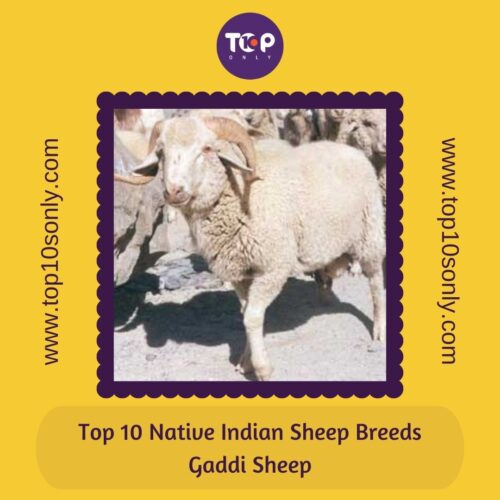
gaddi sheep
The Gaddi sheep is one of the best indigenous sheep breeds in India. It is among the eight sheep breeds that live in the northern temperate regions of India. It is one of the popular breeds that are known for their wool production. Here are some of the features and characteristics of the Gaddi sheep breed.
This Native Indian Sheep Breed Is Also Known As
Bhadarwah
Home Tract
It is native to the Bhadarwah and Kishtwar regions of Jammu. It is also widely distributed in Uttarakhand and Himachal Pradesh.
Physical Characteristics
These are animals that are medium-sized. The male sheep, or rams, usually have large horns, and the female sheep, or ewes, are polled. These sheep can occasionally be brown, black, or tan in colour but generally white or uncoloured. The Gaddi sheep have short ears and a thin, small tail. They have brown hair on their faces.
Fleece Colour
They have a white coloured fleece.
Weight
The average body weight varies between 29 to 34 kg.
Wool Quality And Use
The fleece is fine, dense, and can grow up to 5cm in length. The wool is used for making blankets and shawls.
Annual Wool Yield
1 to 1.5kg and is clipped thrice a year.
Climate Tolerance
Is suited to the native climate
Interesting Facts
They are hardy and good climbers. Under proper farming conditions, the lambing percentage is 58.9%. The size of the litter is single, and cross-breeding is limited and done only with other exotic breeds that produce fine-quality wool.
Use
This sheep breed is used mainly for wool production.
Cost
NA
2. Chokla Sheep
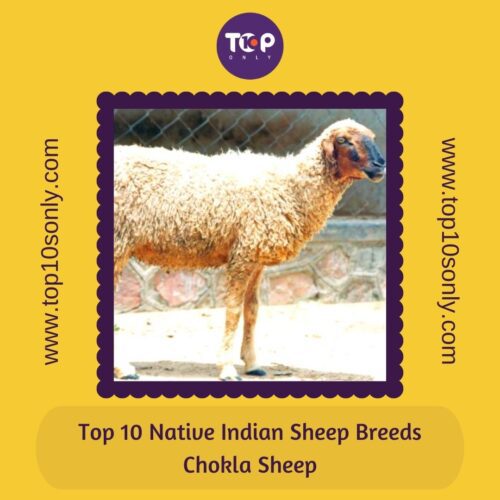
chokla sheep
The Chokla Sheep is one of the sheep breeds that are multi-purpose. These are one of the best sheep breeds in India for wool and meat. It is one of the best carpet-wool breeds of sheep. Due to the shortage of such fine-quality wool, this native Indian sheep breed is being cross-bred with other exotic breeds. Some of the major characteristics of this breed are:
This Native Indian Sheep Breed Is Also Known As
Shekhawati and Chhappar
Home Tract
These sheep breeds are native to the Sikar, Napa, and Churu districts of Rajasthan.
Physical Characteristics
This sheep breed is small to medium in size and has a face that has no wool. The colour of the face is dark or reddish brown and extends to the neck. The skin colour is pink, and the ears are tubular and of small to medium length. They have a tail that is medium length and thin. The coat is fine and dense.
Fleece Colour
They have a white coloured fleece.
Weight
The average body weight of a male Chokla sheep is 41kg, and that of the female is 31kg.
Wool Quality And Use
The fleece is fine, dense, and can grow up to 6cm in length. The wool is used mainly for making fine-quality carpets.
Annual Wool Yield
2.74 kg
Climate Tolerance
They can easily be migrated to other regions.
Interesting Facts
The wool that is produced by these sheep is heterogeneous. Since they produce fine-quality wool, they are mixed with the coarse wool of other sheep before being used for the carpets. Another interesting fact about this sheep is that the lambing percentage is 75, which is high compared to others. The litter size is usuallysingle,e with rare chances of twins. Male lambs that are not used for breeding or wool are sold for their meat at 5 to 7 months of age.
Use
This sheep breed is reared both for its wool and meat.
Cost
Rs 3,500 to Rs 4,000.
3. Mandya Sheep
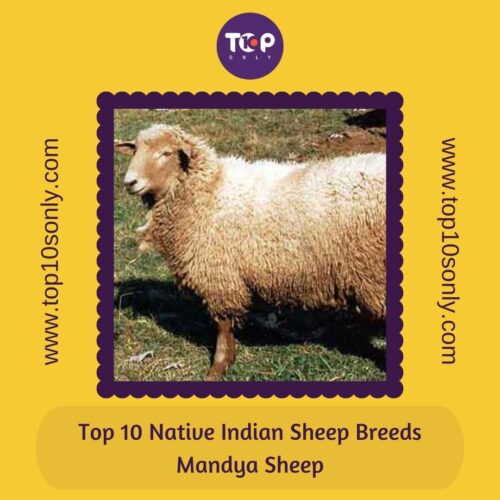
mandya sheep
Mandya Sheep are among the best sheep breeds for meat in India. These are also one of the most common and popular sheep that are found in India. These relatively small-sized sheep are known as the best meat producers in terms of taste and quality. More information on their features and characteristics is given below:
This Native Indian Sheep Breed Is Also Known As
Bandur or Bannur Sheep
Home Tract
Mandya and the bordering Mysore districts of Karnataka.
Physical Characteristics
This is a breed of sheep that has a compact body and is relatively small in size. They have a typical reverse U-shaped conformity from the back. They have ears that are drooping and long and a face that has a slightly Roman nose. Their tails are thin and short. The horns are polled by both sexes.
Fleece Colour
The fleece colour is typically white, but in some cases, it may be light brown.
Weight
The average body weight of a male adult sheep is 34 kg, and that of a female is 23 kg.
Wool Quality And Use
The coat is hairy and coarse, and the length of the wool fibres can be 7 cm.
Annual Wool Yield
1.1 to 3.3 kg
Climate Tolerance
This native Indian sheep breed thrives well in hot and humid conditions.
Interesting Facts
These are sheep that thrive best in places with growing pastures. It has a lambing percentage of 70, and the size of the litter is one.
Use
These sheep breeds are reared both for their wool and meat and, sometimes, for fighting.
Cost
Rs 12000 to Rs 18,000.
4. Nilgiri Sheep
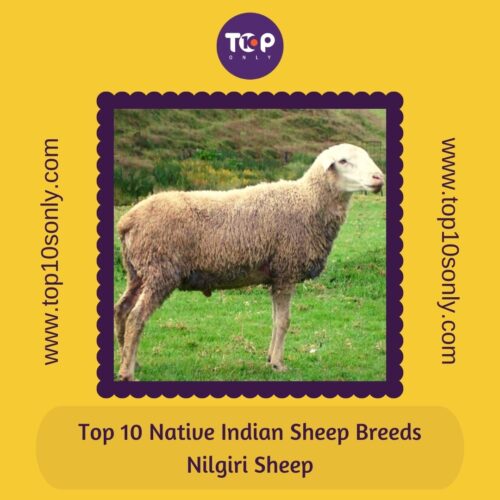
nilgiri sheep
The Nilgiri sheep is one of the mountain breeds that are among the ten famous sheep breeds in India. It is said to have evolved in the 19th century and comes from a cross-breed with an unknown origin. The sheep are maintained for their manure by flock owners and tea planters, but they are facing extinction. There is a national plan that is being implemented to conserve this breed of sheep. The features of this sheep are as below:
This Native Indian Sheep Breed Is Also Known As
NA
Home Tract
They are found in the Nilgiri hills of Tamil Nadu
Physical Characteristics
This is a sheep that is of medium size with a face that is convex shaped. The body is white, and some have patches of brown on the body and face. They have a typical Roman nose with ears that are drooping, flat and broad. Male sheep have horn buds, while female sheep are polled. They have a tail that is thin and of medium length.
Fleece Colour
The fleece colour is white and is dense and fine.
Weight
The average body weight of a male adult sheep is 31 kg, and that of a female is 25kg.
Wool Quality And Use
The wool that this native Indian breed of sheep yields is of fine quality and is used to make apparel and carpet. Its fleece can grow up to a length of 4.5 cm.
Annual Wool Yield
1.1 to 1.2 kg
Climate Tolerance
It thrives well in its native climate.
Interesting Facts
Cross-breeding with Rambouillet and Russian merino has helped increase the fleece’s weight and quality.
Use
These sheep breeds are reared both for their wool, meat, and manure.
Cost
NA.
5. Karnah Sheep
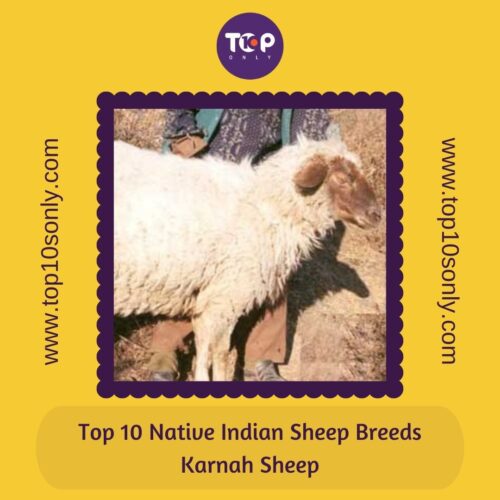
karnah sheep
Karnah is one of the 10 most popular sheep breeds in India and is also the oldest that is found in the Kashmir valley. It is not a dairy animal but was mostly developed by farmers for the fine wool that they use to make apparel for the winter. It is among the endangered sheep breeds listed by the National Bureau of Animal Genetic Resources. The features and characteristics of this sheep are:
This Native Indian Sheep Breed Is Also Known As
NA
Home Tract
It is mainly found in the mountain regions of the Kupwara district in north Kashmir.
Physical Characteristics
These are large-sized sheep that have a deep bodies. They have a prominent nose line with ears that are medium-sized and pendulous. The male sheep have large curved horns, and the females have polled horns. They have no wattles and a head profile that is convex. The tail is thin, straight, and of medium length.
Fleece Colour
The fleece colour is white.
Weight
The average body weight of a male adult sheep is 31 kg, and that of a female is 38kg.
Wool Quality And Use
The wool that the sheep yields is of fine quality and is used to make apparel. Its fleece can grow up to a length of 12 to 15 cm.
Annual Wool Yield
1.0 to 1.5 kg
Climate Tolerance
They thrive well in the cold mountainous regions of Kashmir.
Interesting Facts
It is not a dairy animal, but in case a lamb dies, the milk that is derived from the female sheep is used for domestic use. The litter size is usually one, but twinning can also happen.
Use
These sheep breeds are reared mainly for their wool and meat.
Cost
NA.
6. Deccani Sheep
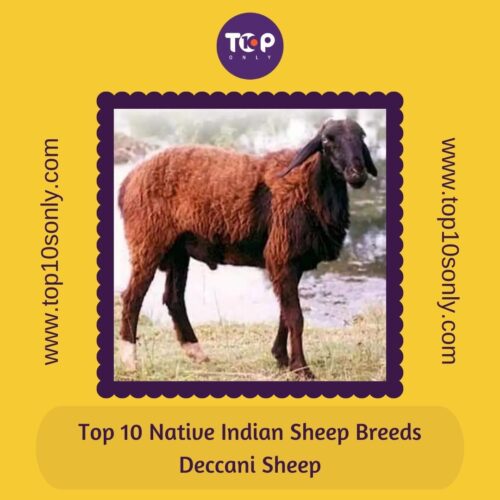
deccani sheep
The Deccani sheep gets its name as it originates from the Deccan region. It is one of the most recognised top 10 sheep breeds in India and is the only sheep to produce black coarse wool. Though it is highly climate-resilient, it is rapidly disappearing and highly threatened. Some of the characteristics of this sheep are:
This Native Indian Sheep Breed Is Also Known As
Black Sheep, or Nalla Gorre
Home Tract
It is found in parts of Andhra Pradesh and Karnataka but mainly in the Deccan regions.
Physical Characteristics
These are medium-sized sheep that are mainly black and have white markings. Some of these are brown or white in colour. The male sheep have horns, but the females are polled. They have ears that are drooping, flat, and long. The tails of these sheep are thin and short.
Fleece Colour
The fleece colour is black and grey.
Weight
The average body weight of a male adult sheep is 31 kg, and that of a female is 38kg.
Wool Quality And Use
The wool that the sheep yields are of low grade and is coarse. It is used to make rough blankets (kambals).
Annual Wool Yield
54 kg
Climate Tolerance
They are hardy and adapt well to tough weather conditions, including poor pastries.
Interesting Facts
It is not a dairy animal, but in the event that a lamb dies, the milk that is derived from the female sheep is used for domestic use. The litter size is usually one, but twinning can also happen. The lambing percentage is 75 under farming conditions, and the size of the litter is one.
Use
These are one of the best mutton breeds of sheep in India that are reared mainly for their mutton.
Cost
NA.
7. Muzaffarnagari Sheep
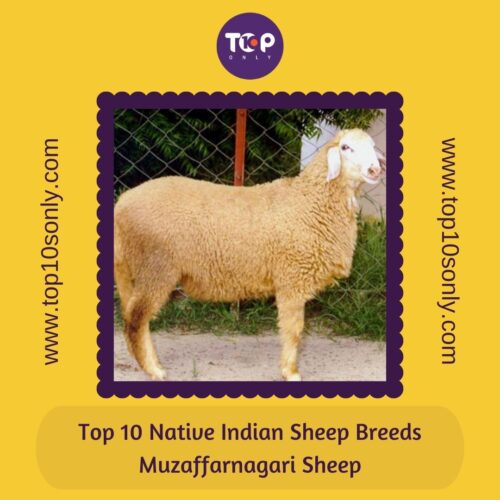
muzaffarnagari sheep
It is one of the most important mutton breeds in India. They are among the heaviest and the largest sheep breeds in India. These sheep are highly adaptable to their native climate and are popular for their fast growth rate. Here are the other features of this sheep:
This Native Indian Sheep Breed Is Also Known As
Bulandshahari
Home Tract
They are native to Muzzafarnagar and nearby districts in West Uttar Pradesh. There is also a sizeable population in parts of Haryana and Delhi.
Physical Characteristics
These sheets can be medium- to large-sized. They are very well-adapted and are one of the largest breeds in irrigated areas. They have a body and face that are white in colour and have patches of black or brown. The ears of both sexes are drooping and long, and males have rudimentary horns. The tail is long and touches the fetlock.
Fleece Colour
The fleece colour is white and coarse.
Weight
The average body weight of a male adult sheep is 50 kg, and that of a female is 40kg.
Wool Quality And Use
The wool that the sheep yields is coarse and of low quality and is used in cheap-quality carpets.
Annual Wool Yield
600 g to 1 kg.
Climate Tolerance
They are suited for semi-arid conditions.
Interesting Facts
This sheep is a large one and hence can only produce a single litter. On rare occasions, they can breed twins or triplets.
Use
These sheep breeds are reared mainly for their mutton.
Cost
NA.
8. Patanwadi Sheep
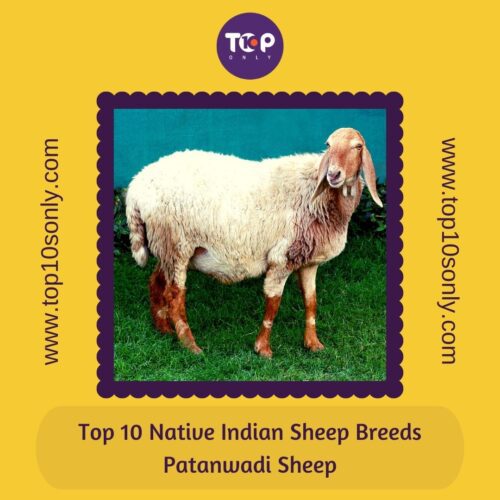
patanwadi sheep
The Patanwadi sheep is one of the best dual-purpose native Indian sheep breeds and comes in three distinct types:
- The non-migratory type, which is the typical Patanwadi Sheep, yields fine fleece.
- The migratory type has a larger body and coarser fleece.
- The meat type has a big body and coarse fleece.
Find below the characteristics and features of this native Indian sheep:
This Native Indian Sheep Breed Is Also Known As
Charotari, Vadhiyari, Kathiawari, and Kutchi
Home Tract
They are native to Gujarat, especially the coastal regions of Kutch and Saurashtra districts. It is also present in the areas of Chanssama, Sidhapur, Kadi, Kalo and Patan districts of Gujarat.
Physical Characteristics
They are medium to large-sized animals with a body coat that is white and a brown face. The nose is typically Roman, with ears that are tubular and large. They have relatively long legs with a tail that is short and thin. The horns of both sexes are polled.
Fleece Colour
The fleece colour is white and not very dense.
Weight
The average body weight of a male adult sheep is 33 kg, and that of a female is 26 kg.
Wool Quality And Use
The wool that the sheep yields is of medium quality and is hence used to make carpets of medium quality.
Annual Wool Yield
1.2 kg
Climate Tolerance
They are suited for semi-arid conditions.
Interesting Facts
This sheep is a large-sized one and hence can only produce a single litter. On rare occasions, they can breed twins or triplets.
Use
These sheep breeds are reared mainly for their wool and meat.
Cost
7000 to 8000 Rs.
9. Madras Red Sheep
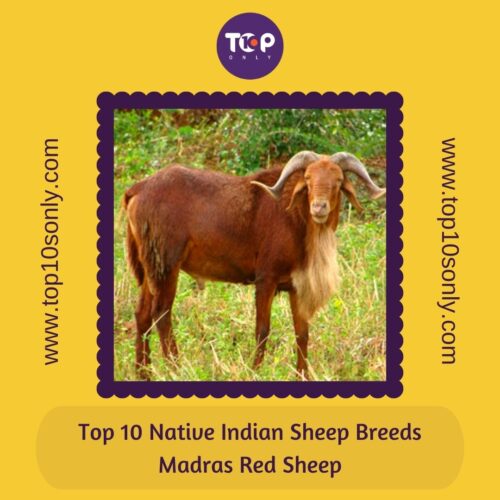
madras red sheep
The Madras Red is one of the top native Indian sheep breeds in India. This indigenous sheep is a breed prized for its meat or mutton. They are fast-growing, have low-fat meat, are early maturing, and have good mothering capabilities. High-quality meat is popular in the market for its tasty flavour. The other features and characteristics of this sheep breed are:
This Native Indian Sheep Breed Is Also Known As
Kattupakkam Red
Home Tract
They are natives of Chennai and Kanchipuram districts of Tamil Nadu.
Physical Characteristics
They are medium-sized animals that are brown in colour. Some of these sheep have white marks on the lower abdomen, thighs, and forehead. The ears are drooping and large, and the tail is thin and short. The male sheep have twisted and corrugated horns, while the female is polled.
Fleece Colour
The fleece colour is brown and varies in intensity from dark brown to light tan.
Weight
The average body weight of a male adult sheep is 35 kg, and that of a female is 24 kg.
Wool Quality And Use
Wool production is low, and it is very coarse. It is used for carpets.
Annual Wool Yield
NA
Climate Tolerance
They are suited for semi-arid conditions.
Interesting Facts
This sheep breed has intense grazing of 8 to 10 hours. The lambing percentage is 93 and gives a single litter. Madras Red Sheep are the best native sheep breeds in India for the highest profits.
Use
These sheep breeds are reared mainly for their wool and meat.
Cost
Rs 13,000 approximately
10. Magra Sheep
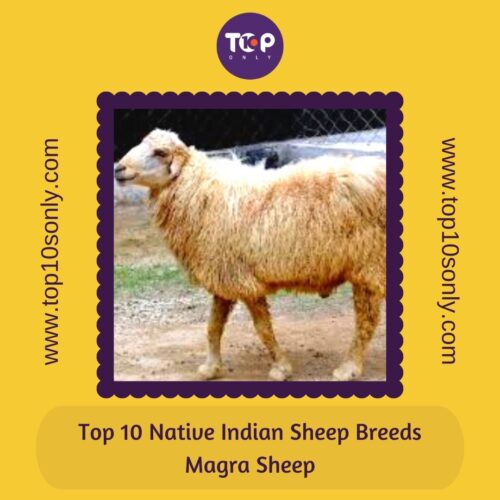
magra sheep
The Magra sheep is one of the breeds that produce lustrous carpet-producing wool and is thus in great demand. While there are many crossbreeds, the pure breeds are found in small numbers and hence need conservation. The features and characteristics of this sheep are:
This Native Indian Sheep Breed Is Also Known As
Bikaneri, Chakri or Chokhla
Home Tract
The pure breeds are found in the southern and eastern areas of Bikaner. They are also found in Churu, Jaisalmer, and Nagpur districts of Rajasthan.
Physical Characteristics
They are medium to large-sized sheep that have a body coat that is white. The face is white, with the eyes having light brown patches surrounding it. The skin is pink in colour, and both sexes have horns that are polled. The ears are tubular and small to medium. The tail is thin and medium in length.
Fleece Colour
The fleece colour is extremely lustrous and white.
Weight
The average body weight of a male adult sheep is 27 kg, and that of the female is 25 kg.
Wool Quality And Use
The wool is lustrous and useful for making high-quality carpets. The shearing is done three times a year.
Annual Wool Yield
2.18 kg
Climate Tolerance
They are suited for semi-arid conditions.
Interesting Facts
The lambing percentage is 45, and it gives a single litter size. They produce three varieties of wool based on the season. They are called Siyadu, or winter wool, Ashadhu, or monsoon wool, and Chaitu, or summer wool.
Use
These sheep breeds are reared mainly for their wool.
Cost
Rs 7500 to Rs 8500.
Conclusion
So, this was our list of the top ten best Indian sheep breeds, each with unique qualities suited for specific purposes.. Some of these are suited for meat production, while others are ideal for their wool and skin. There are a few which are great as multipurpose goats. It can be raised on barren, hilly, uncultivated fallow lands or deserts. The best part about raising sheep is that it requires minimal investment and specialised knowledge, making it a lucrative activity in which the whole family can participate.
While you’re here, be sure to check out our article that lists the Top 10 Best Native Indian Goat Breeds! Also, pet lovers ought to check out our Top 10 Native Indian Dog Breeds article, which lists the best indigenous breeds of dogs found in India.
Frequently Asked Questions About The Native Sheep Breeds Of India
1. Which sheep are mostly found in India?
Chokla, Mandya, and Muzzaffarnagari are some of the popular sheep breeds found mostly in India.
2. Which is the biggest Indian sheep?
The Muzzafarnagari Sheep is believed to be the heaviest and tallest Indian sheep.
3. Which sheep meat is the tastiest in India?
The Mandya sheep is said to have the tastiest meat in India.
4. Which sheep is best in India?
Deccani, Madras Red Sheep, Karnah, and Patanwadi are some of the best sheep breeds reared in India. More details about these popular Indian sheep breeds are given in the article above.
5. Which sheep is best for wool in India?
Wool from Chokla sheep has been said to be the best quality wool in India.

